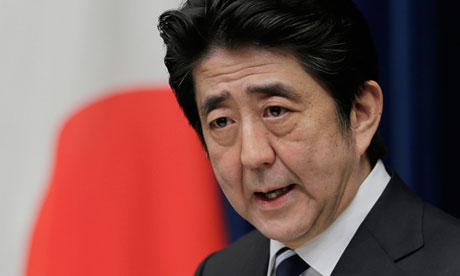The Guardian (UK)
Justin McCurryJune 11, 2013.
Landmark ruling in favour of four forced labourers risks inflaming tensions between neighbours over Japan's occupation
The Japanese prime minister, Shinzo Abe, has given ambiguous
messages on
how Japan should view the war.
(Photograph: Itsuo Inouye/AP)
A court in South Korea has ordered a Japanese steelmaker to pay more than £230,000 in compensation to four Korean citizens who said the firm used them as forced labour during the second world war.Read the rest here.
Wednesday's ruling by the Seoul high court – the first of its kind in South Korea or Japan – comes amid heightened bilateral tensions over territory and conflicting interpretations of Japan's 1910-45 occupation of the Korean peninsula.
The court ordered Nippon Steel and Sumitomo Metal to pay 100 million Korean won (£58,500) to each of the four plaintiffs for unpaid salaries and psychological distress.
The steelmaker had engaged in "crimes against humanity by joining the Japanese government in mobilising forced labour for the sake of the war of aggression", the court said in its ruling.
Nippon Steel, which merged with Sumitomo Metal Industries last year to become the world's second biggest steelmaker, had argued that it was no longer the same entity that had employed Korean workers during the war.
The same plaintiffs, one of whom is 90, had previously sought redress through a court in the Japanese city of Osaka in 1997, but their claim was rejected on the grounds that Nippon Steel was not responsible for the firm's actions during the war.
Japanese firms are occasionally targeted by Korean and Chinese workers seeking damages for their time as forced labourers, but Japan insists that all compensation claims involving Korean citizens were settled when the countries restored diplomatic ties in 1965. At that time, Japan paid South Korea a lump sum of $500m.
Nippon Steel said it would appeal against the decision. "We deeply regret this unjustified ruling, which goes against the 1965 Japan-Korea claims settlement agreement – a formal agreement between nations – that completely and finally resolved such issues as forced labour," it said in a statement.
*****
Comment: This is an interesting case and turn of events that may have implications for those of us in South Africa who still believe that big corporations benefited from apartheid.It is most likely that Nippon Steel will argue that the past was settled by an international agreement as the article indicates. The same is largely true for foreign owned and domestic corporations that benefited from apartheid.
The question for me is whether individual citizens who suffered damages under oppression should not continue to seek recourse in civil courts despite agreements about what the past means and who should have recourse and why.
I think that such court cases may be thought of as frivolous but there is more to confronting the past than just seek monetary recompense.
There is also the matter of making the past known. Such cases inevitably dig into the past to uncover the details of abuse and this is a distinct manner of making the past known.
A greater part of the recompense lies in the formal recognition of abuse that goes beyond international agreements that often blanket the individual harm suffered.
Onward!

1 comment:
I received a comment on a post from January 11 that deals with so called comfort women. I thought there was very important information and links contained and I am reproducing it here for wider access:
Again, I'd like to raise the current comfort women issue. Actually I don't care about the comfort women issue Japanese army caused. That's the history and over. Also it was just a problem lasting for five years or so though it was during the war time. However, the current comfort women problem has been going on for over half a century. Yes, the comfort women issue is still going on -- they changed the customers from the Japanese army to the USA army, but their business has kept on going. Please read the Stanford or Rhode Island university reports. They're a free report, then you can see who is behind the scene. This looks the nation related problem because the government seems involved, and perhaps that's why it's so hard for people to know this problem.
Modern day comfort women - University of Rhode Island.
http://www.uri.edu/artsci/wms/hughes/modern_day_comfort_women.pdf
Also you can visit the page (modern comfort women) to know more, which is https://www.facebook.com/pages/Modern-Comfort-Women/389352384499538
Post a Comment